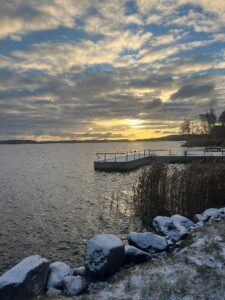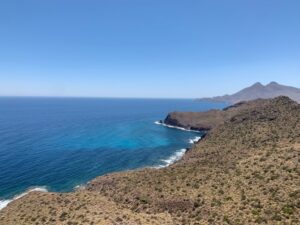Kategorie: ‘Energy Engineering’
Internship in Sweden
- Energy Engineering M.Sc.
- Sweden, Tranas
- Bosch Thermoteknik AB
- 09/2023 – 03/2024

© Anna Bley
Internship Search:
When I was on the hunt for an internship abroad, I turned to LinkedIn to check out job listings in countries and cities I was interested in. It was a pretty straightforward way to find some cool opportunities. I also spent some time browsing through the websites of companies I liked, hoping to stumble upon any international gigs. That’s how I came across an internship listing for Sweden on one company’s site, and I wasted no time in applying. Both methods worked out pretty well for me, so I’d definitely recommend giving them a shot to widen your search.
Accommodation & Living:
During my internship, I ended up in Tranås, a cozy town in Sweden’s Jönköping province. The company sorted out our living arrangements in a wing of a golf hotel, which was a short drive from where we worked. Each of us had our own room, fully furnished with everything we needed, and we shared common areas like the kitchen and living room. The hotel also had some cool extras like laundry facilities, a gym, and even a sauna. Plus, it was right by Lake Sommen, which was perfect for relaxing after work.
Getting around was a breeze too, thanks to the company providing us with three cars to use. They covered all the costs, which made things a lot easier. Having accommodation sorted out by the company made settling in a lot smoother, and with 13 of us from different parts of the world, it was easy to make friends and feel at home.
Everyday Life/Internship Experience:
Swedes are really good at English, so communicating with everyone was no problem at all. But they definitely appreciate it when you make an effort to speak a bit of Swedish too. I used Duolingo to learn some basics, and it definitely helped me feel more connected.

© Anna Bley
Starting a new job in Sweden means getting into the Fika tradition, where you take breaks with your team for coffee and snacks. It’s a great way to bond and chat about stuff. The office vibe is pretty relaxed too – even the big bosses wear jeans and T-shirts to meetings.
When it comes to work, everyone’s pretty chill and informal. It’s all about working together as a team, and everyone’s opinion matters, no matter their position. I was pleasantly surprised by how much my input was valued as an intern. The work culture is all about trust and giving people the freedom to do their thing. Swedes take a lot of pride in their work and love showing off their company logos.
Free Time/Tips:
Getting outdoors is a big thing in Sweden, no matter what time of year it is. Thanks to the Right of Public Access, you can explore nature, pick berries, and even camp out pretty much anywhere (as long as you’re respectful). Camping around Lake Vättern is a must-do, with plenty of shelters and awesome trails to check out.

© Anna Bley
Weekends are perfect for exploring nearby towns like Gränna and Eksjö, or even bigger cities like Linköping and Jönköping. And if you’re up for it, why not take a trip to Gothenburg or Stockholm? Both cities are just a few hours away by train and totally worth it. Gothenburg, especially around Christmas time, is super charming and definitely worth a visit.
And don’t leave Sweden without going on an elk safari – it’s a blast! We booked one near Eksjö in December, and it was so much fun. If you can, try to go during the winter when everything’s covered in snow – it makes the whole experience even more magical.
The best part of my time in Sweden was the trip to Swedish Lapland. We stayed at Camp Alta near Kiruna and did all sorts of cool stuff like snowmobiling and seeing the Northern Lights. Even though it was freezing cold, it was an experience I’ll never forget.
Conclusion:
Sweden has something for everyone, whether you’re into winter sports or just chilling out in nature. The work culture is super relaxed, and people are really friendly and welcoming. Whether you’re grabbing a coffee with your team or exploring the great outdoors, Sweden is the perfect place for an internship adventure.
Internship in Antwerp
- Business Administration and Engineering: Mechanical Engineering M.Sc.
- Belgium, Antwerp
- Evonik Industries AG
- 03/2023 – 07/2023
1. Application/Finding an internship
The path to my internship led me though the Unitech program which I can very much recommend.
Because of that, I will explain the program here shortly. More information about it can be found under
unitech-international.org and via the RWTH where it is listed under the options to go abroad. It is a one
year long program for engineering students by the Unitech International Society which is a network of
European universities and partner companies. The program usually consists of an exchange semester in
fall/winter and an internship in spring which are joined by three weeks of additional activities in the
beginning, the middle and the end of the year. There, students meet, work on projects and are coached in
non-technical skills such team work or leadership. So overall, you are getting to know an even larger
group of people as well as making contacts into the professional world when compared to a normal
exchange. Additionally, it allows for an internship experience abroad, if you want. I am convinced that
without Unitech, my goal to do an internship abroad that fitted my study background and interests would
not have been possible in a comparable way. It created a platform to meet and discuss my goals and
interests with the participating companies to find the internship.
It is worth mentioning that (longer) internships are not that common in Belgium during the studies and
have to be confirmed by the regional government. This seems to ensure that students are not used as
cheap labor. The company needs to hand in an internship plan defining learning goals etc. This was
quickly assessed and accepted, so in my case no problem and I was supported well by the company.
2. Accomodation & Living expenses
The chemical industry cluster in the Port of Antwerp is one of the biggest in the world, stretching for the
city for around 30-40km up the river Scheldt to the Dutch border. The companies present there are
connected to the city by a bus system and dedicated lines for cycling. Antwerp is also beautiful and a
great place to live which played a role in convincing me to take on the internship. Thus, it made perfect
sense to search for accommodation in the city, which is also a student city and has a lot of housing
opportunities. Whether you are allowed to take a student housing as an intern depends on the
organization, but I found a place to stay this way and lived the months in a student room with a big shared
kitchen for the whole floor. It was a fairly new private building and living conditions where excellent. Prices
are higher than in Aachen, but I am confident in saying that something decent can easily be found for
500-600€ a month like in my case, with more time also below that.
Living expenses in Belgium are slightly higher than in Germany, although I spent my time there in an
inflationary period so that when coming back, I had to realise that prices were not same back home to
compare with. Especially food and stuff you would buy in dm or Rossmann I definitely found more
expensive and worth bringing from Germany from time to time and as far as possible.
In terms of taxes, insurance and other expenses, I can only say that as an EU citizen I was able to keep
the German insurance and paid a relatively small amount of income tax as a student. I have no
information on what general rules apply, just my specific case.
3. Everyday life/ the internship
First of all, Antwerp is not too far away from Aachen, within the EU and with a surprising high share of
German speakers, at least among the older generations. From that perspective, cultural differences are
surprisingly big and were in my view a very positive experience. I experienced people very open,
welcoming and very good in speaking English. French on the contrary is not as helpful and welcome as
Antwerp is in the Flemish speaking part and not in Wallonia. The differences like the language between
the different parts of Belgium (also the lack of understanding between Flemish speaking regions) where
very interesting to learn about.
I worked form 8:00 to 16:45 and took 30 mins by bus before and afterwards that was free and organized
by the industrial hub for commuting workers. Cycling is very popular in Antwerp and with summer
approaching, I also used my bike for the 17km commute along the river. This was not as beautiful as it
may sound, as the view is dominated by (petro-) chemical industry and container terminals, but
impressive and excellent in infrastructure for cycling. This goes for the whole city as well, as there is a
great well-balanced mixture of modes of transport. Cycling to work is also supported by a certain amount
of money depending on the distance. This would not have been necessary to motivate me, but indicates
the local will and need to get people away using from cars.
My work at one of the present chemical industry sites focused on how to achieve sustainable energy
supply, which very well suited my study background. There are mainly production sites of multi-national
corporations and it was very impressive as well as a bit intimidating to be part of the production of modern
Society’s needs for fuels, plastics, nutrition, fertilizers, care products and all other chemical products
concentrated in one area. I can recommend visiting not only to people with my specific focus on energy
engineering, as it shows the challenges that contradict the notion of just having to transition such an
existing infrastructure and ecosystem to climate neutrality quickly when ambition, will and the necessary
technical solutions are all there. I was allowed to support in projects with the goal to achieve this and it
gave me great insights how this is approached and how my acquired knowledge can be applied.
4. Free time/tips
I lived in a part of the city called Eilandje, which is in the North of the city and very recently modernized
and built around the old docks that are now too small for modern big ships and mainly used for leasure
boats. This means there is a lot of wide space around the water together with museums, bars and
restaurants as well as possibilities to spend free time. In contrast, in the central old town you find beautiful
streets and squares around the cathedral close to the river bank with the Market Square and even more
restaurants and bars. Between the two parts of the city, there are a lot of student homes and activities so
that this overall area is probably the best area to stay in Antwerp, although the South of the city is nice as
well.
Compared to other Western European cities, you will find most of what is a trend and successful brand in
other countries also present in Antwerp. Nevertheless, the restaurant and bar culture is more vibrant and
young people seem to be around a lot. Next to the opportunities the city itself has to offer, it is relatively
easy to get to Rotterdam and Amsterdam in the North as well as Brussels, Gent, Brugge or even Paris in
the South. Even though Antwerp has the second biggest port in Europe, it is still quite a bit to the coast
but it is probably no problem to go there as well.
5. Conclusion
All in all, I can recommend Unitech or any other path to an internship abroad, even if it is seemingly close
by like Belgium. Belgium to me is a very interesting and beautiful country I would never have discovered
in such a way and my stay allowed for numerous different perspectives and insights I would not want to
miss. I spent a great time and can recommend the country, the city of Antwerp and the idea to work or do
an internship there.
Writing my master’s thesis in Almería, Spain
- Energy Engineering M.Sc.
- Spain, Almería
- German Aerospace Center (DLR)
- March 2022 – August 2022
The Institute for Solar Research, which is part of the German Aerospace Center (DLR), maintains a research site in Almería in the south of Spain. I spent six months at this location to write my master’s thesis.
Preparation and general tips:
I applied for the master’s thesis in November 2021 and received an invitation to an online meeting with my supervisor quite quickly. After I had the acceptance and we agreed on a topic, I applied for the Erasmus scholarship in January 2022. In February 2022, I booked my flight and started looking for an apartment. The apartments and shared rooms in Almería are cheaper compared to Germany. I found my apartment through “idealista” and had support from people who also worked at DLR and already lived in Almería. Since you can find an apartment quickly, you can also move into a hostel for the first few days and start looking locally.
I recommend looking for an accommodation in the Centro (near the bars and restaurants) or in Zapillo (near the beach), because you can get everywhere quite quickly from there. Most of the landlords do not speak English, so you should write your requests on “idealista” in Spanish. From a language course, I already knew some basics in Spanish, but I mostly got by with an online translator. Also, if you start at DLR, make sure you get a rental contract, as you will need it for later registration with the authorities.
Job and everyday life:
Some students had to take the bus to the Plataforma Solar de Almería (PSA) in Tabernas (about 45 minutes). I worked in the office in the center of Almería. It is surrounded by many different tapas bars and restaurants. We made use of this with the colleagues and usually went out during our lunch break. Eating tapas in Almería is comparatively inexpensive.
In the office we communicated in German or in English. In everyday life, however, you need Spanish, because most of the local people do not speak English. Thus, one learns the most important basics quite quickly. If that’s not enough, you can take a language course (there are several language schools in Almería) or participate in the events of the Erasmus Office to find a language buddy.
Almería is a small town but has everything to offer what you need. Plenty of supermarkets, a nightlife and larger shopping centers a little outside. The university is also located a bit outside but is easily accessible by bus. Almería has an airport, but unfortunately there are no direct flights from Germany.
Leisure:

© Rafal Broda
The weather in Almería is great. After work, I often met up with my colleagues from DLR, my roommates or other Erasmus students. We usually met on the beach to play beach volleyball. In the evenings, you can go out for tapas in Almería or go dancing in one of the music bars. I have found that it is quite difficult to socialize with local people, mainly because of the language barrier, but since there are a lot of international students coming to the university, it is overall quite easy to make new contacts. On some weekends we made trips to the nearby nature park Cabo de Gata. There you can hike, snorkel or just relax on one of the many beautiful beaches. I can highly recommend a visit there. On long weekends, you can also take a trip of several days to Granada or Seville to explore Andalusia a bit. From Almería, you can also take a ferry to Morocco. If you are interested, remember to bring your passport.
Conclusion:
Overall, I had a very nice time in Almería. I can definitely recommend doing an internship or thesis at the Institute of Solar Research in Almería. I experienced a lot during this time, met many nice people and improved my Spanish.

